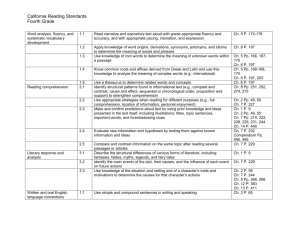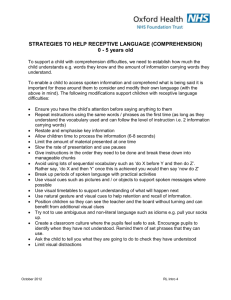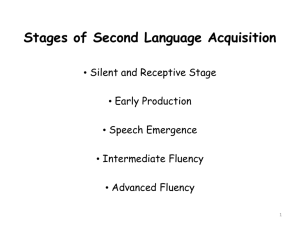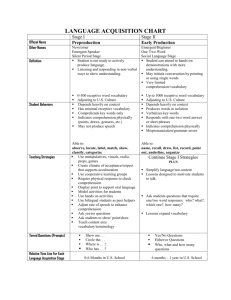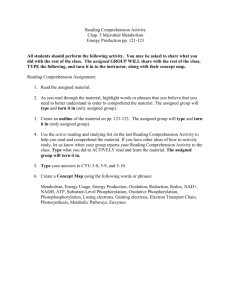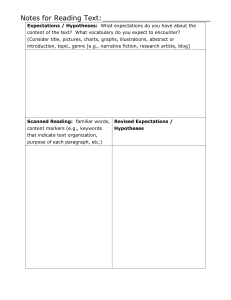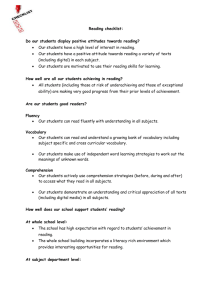File - Friendly Phrases & Other ESL Resources
advertisement
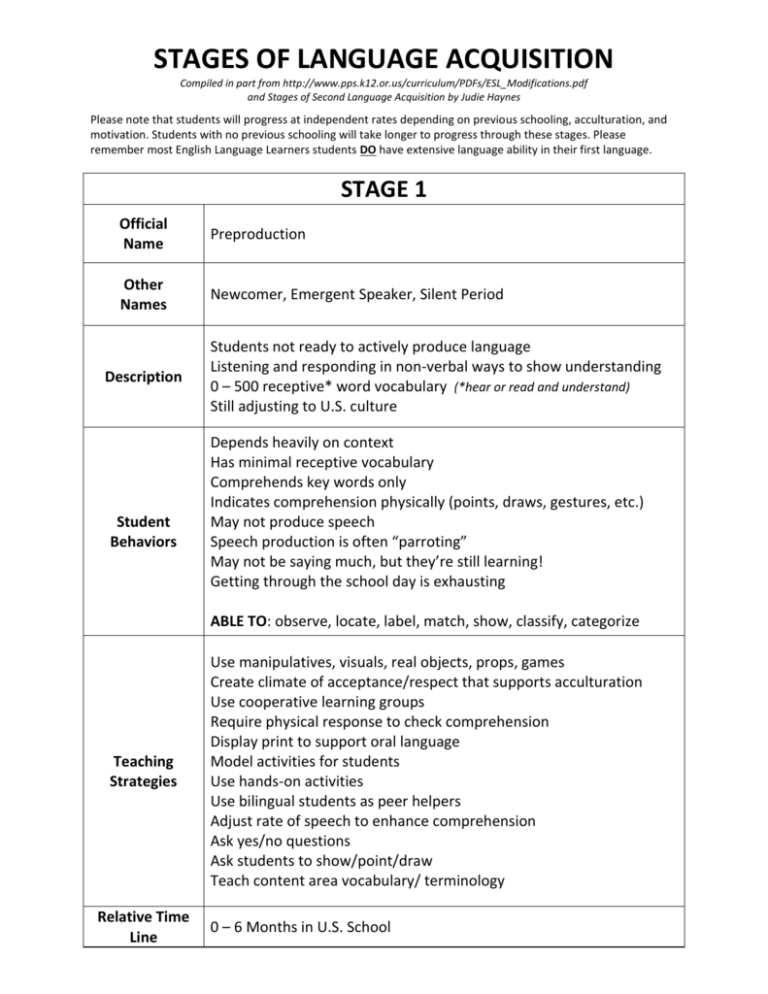
STAGES OF LANGUAGE ACQUISITION Compiled in part from http://www.pps.k12.or.us/curriculum/PDFs/ESL_Modifications.pdf and Stages of Second Language Acquisition by Judie Haynes Please note that students will progress at independent rates depending on previous schooling, acculturation, and motivation. Students with no previous schooling will take longer to progress through these stages. Please remember most English Language Learners students DO have extensive language ability in their first language. STAGE 1 Official Name Preproduction Other Names Newcomer, Emergent Speaker, Silent Period Description Student Behaviors Students not ready to actively produce language Listening and responding in non-verbal ways to show understanding 0 – 500 receptive* word vocabulary (*hear or read and understand) Still adjusting to U.S. culture Depends heavily on context Has minimal receptive vocabulary Comprehends key words only Indicates comprehension physically (points, draws, gestures, etc.) May not produce speech Speech production is often “parroting” May not be saying much, but they’re still learning! Getting through the school day is exhausting ABLE TO: observe, locate, label, match, show, classify, categorize Teaching Strategies Relative Time Line Use manipulatives, visuals, real objects, props, games Create climate of acceptance/respect that supports acculturation Use cooperative learning groups Require physical response to check comprehension Display print to support oral language Model activities for students Use hands-on activities Use bilingual students as peer helpers Adjust rate of speech to enhance comprehension Ask yes/no questions Ask students to show/point/draw Teach content area vocabulary/ terminology 0 – 6 Months in U.S. School STAGE 2 Official Name Early Production Other Names Emergent/Beginner, One-Two Word, Social Language Stage Description Follows hands-on demonstrations with more understanding May initiate conversation by pointing or using single words Very limited comprehension/vocabulary Up to 1000 receptive word vocabulary Still adjusting to U.S. culture Student Behaviors Depends heavily on context Produces words in isolation Verbalizes key words Responds with one- or two-word answers or short phrases Indicates comprehension in physical ways Mispronunciation and grammar errors ABLE TO: name, recall, draw, list, record, point out, underline, organize Continue Stage I Strategies PLUS Teaching Strategies Relative Time Line Simplify language/not content Focus on key vocabulary/concepts Lessons designed to motivate students to talk Ask students questions that require one/two word responses: -- Who? What? Which One? How Many? Lessons expand vocabulary Provide listening activities Begin to foster English writing through labeling and short sentences 6 Months to 1 year in U.S. School STAGE 3 Official Name Other Names Description Student Behaviors Low Intermediate Short Phrases/Simple Sentences, Social Language Stage, Speech Emergence Students begin speaking in short phrases and simple sentences Many mistakes in grammar, word order, word usage Limited comprehension and vocabulary Up to 7,000 receptive/active word vocabulary Depends heavily on context Produces whole sentences Makes some pronunciation/grammatical errors, but is understood Shows comprehension by responding orally and in written form (charts, graphs, diagrams) Hears smaller elements of speech Functions on a social level Uses limited vocabulary Initiates conversation & questions Shows good comprehension (given rich context) Read short, modified text in content area Match vocabulary word to definitions ABLE TO: tell, describe, restate, compare, question, map, dramatize Continue Stages I & II PLUS Teaching Strategies Relative Time Line List and review instructions step by step Build on students prior knowledge Incorporate more reading and writing Engage students in producing language (describing, retelling, comparing, contrasting, summarizing, graphs, charts, diagrams, etc.) 1 – 3 Years in U.S. School STAGE 4 Official Name High Intermediate Fluency Other Names Bridging, Academic Language Stage Description Student Behaviors Students can communicate thoughts more completely Beginning to use more complex sentences in speech/writing Can have conversations without highly contextualized support Up to12,000 receptive/active word vocabulary Depends on context Engage in and produce connected narrative (discourse) Shows good comprehension Uses expanded vocabulary Makes complex grammatical errors Functions somewhat on an academic level Use strategies from native language to learn English content ABLE TO: imagine, create, appraise, contrast, predict, express, report, estimate, evaluate, explain Continue Stages I-III PLUS Teaching Strategies Relative Time Line Have students brainstorm, list, web, use graphic organizers Ask questions soliciting opinions, judgment, explanation (more “why?” and “how?” questions) Introduce figurative language Develop more academic language (oral and written) Focus on learning strategies 3 – 5 Years in U.S. School STAGE 5 Official Name Advanced Fluency Other Names Exiting Fluency, Academic Language Stage Description Students have advanced skills in cognitive/academic language Beyond 12,000 receptive/active word vocabulary Functions on an academic level with age/grade peers Most students have been exited from ESL and support programs Still need substantial support from classroom teachers (especially in history/social studies and with writing skills) Student Behaviors Maintains two-way conversations Uses more complex grammatical structures Demonstrates comprehension in decontextualized situations Uses enriched vocabulary ABLE TO: relate, infer, hypothesize, outline, revise, suppose, verify, rewrite, assess, justify, critique, summarize, illustrate, judge, demonstrate Continue Stages I-IV PLUS Teaching Strategies Relative Time Line Incorporate note-taking skills Study skills Test-taking skills Demonstrate how to verify answers (oral and written) Expand figurative language (idioms) 5 – 7 Years in U.S. School
